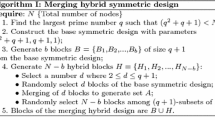Abstract
Wireless sensor networks and Internet of Things (IoT) are part of dynamic networks as new nodes can join while existing members can leave the system at any time. These networks mainly suffer from severe resource constraints like energy, storage and computation, which makes securing communications between nodes a real challenge. Several key establishment protocols have been proposed in the literature. Some of them are based on symmetric polynomials. However, the latter solutions have some limitations, such as the resilience to node capture attacks as well as the storage and computation overheads that are high for constrained nodes. In this paper, we propose a lightweight polynomial-based key management scheme for dynamic networks. The proposed scheme allows nodes to be able to establish secure communications between them, and ensures dynamism by supporting node addition and deletion after the setup phase. It also resists to node capture attack. The performance evaluation shows that our scheme reduces both the storage and computation overheads when compared to other related polynomial-based protocols.
Supported by General Directorate for Scientific Research and Technological Development, Ministry of Higher Education and Scientific Research (DGRSDT), Algeria.
Access this chapter
Tax calculation will be finalised at checkout
Purchases are for personal use only
Similar content being viewed by others
References
Blundo, C., De Santis, A., Herzberg, A., Kutten, S., Vaccaro, U., Yung, M.: Perfectly-secure key distribution for dynamic conferences. In: Brickell, E.F. (ed.) CRYPTO 1992. LNCS, vol. 740, pp. 471–486. Springer, Heidelberg (1993). https://doi.org/10.1007/3-540-48071-4_33
Liu, D.: Establishing pairwise keys in distributed sensor networks. ACM Trans. Inf. Syst. Secur. (TISSEC) 8, 41–77 (2005)
Fanian, A.: An efficient symmetric polynomial-based key establishment protocol for wireless sensor networks. ISeCure-ISC Int. J. Inf. Secur. 2, 89–105 (2010)
Zhang, J.: Key establishment scheme for wireless sensor networks based on polynomial and random key predistribution scheme. Ad Hoc Netw. 71, 68–77 (2018)
Kumar, V., Kumar, R., Pandey, S.K.: Polynomial based non-interactive session key computation protocol for secure communication in dynamic groups. Int. J. Inf. Technol. 12(1), 283–288 (2018). https://doi.org/10.1007/s41870-018-0140-1
Staddon, J.: Self-healing key distribution with revocation. In: Proceedings 2002 IEEE Symposium on Security and Privacy, pp. 241–257. IEEE (2002)
Blundo, C.: Design of self-healing key distribution schemes. Des. Codes Crypt. 1(32), 15–44 (2004)
Mukhopadhyay, S. : Improved self-healing key distribution with revocation in wireless sensor network. In: 2007 IEEE Wireless Communications and Networking Conference (2007)
Daza, V.: Flaws in some self-healing key distribution schemes with revocation. Inf. Process. Lett. 109, 523–526 (2009)
Nafi, M.: Matrix-based key management scheme for IoT networks. Ad Hoc Netw. 97, 102003 (2020)
Blom, R.: An optimal class of symmetric key generation systems. In: Beth, T., Cot, N., Ingemarsson, I. (eds.) EUROCRYPT 1984. LNCS, vol. 209, pp. 335–338. Springer, Heidelberg (1985). https://doi.org/10.1007/3-540-39757-4_22
Du, W.: A key management scheme for wireless sensor networks using deployment knowledge. In: IEEE INFOCOM 2004, vol. 1. IEEE (2004)
Harn, L.: Predistribution scheme for establishing group keys in wireless sensor networks. IEEE Sens. J. 15(9), 5103–5108 (2015)
MathWorks. https://www.mathworks.com/. Accessed 20 Aug 2020
Armando, A., et al.: The AVISPA tool for the automated validation of internet security protocols and applications. In: Etessami, K., Rajamani, S.K. (eds.) CAV 2005. LNCS, vol. 3576, pp. 281–285. Springer, Heidelberg (2005). https://doi.org/10.1007/11513988_27
Author information
Authors and Affiliations
Corresponding author
Editor information
Editors and Affiliations
Rights and permissions
Copyright information
© 2021 Springer Nature Switzerland AG
About this paper
Cite this paper
Nafi, M., Bouzefrane, S., Omar, M. (2021). Efficient and Lightweight Polynomial-Based Key Management Scheme for Dynamic Networks. In: Bouzefrane, S., Laurent, M., Boumerdassi, S., Renault, E. (eds) Mobile, Secure, and Programmable Networking. MSPN 2020. Lecture Notes in Computer Science(), vol 12605. Springer, Cham. https://doi.org/10.1007/978-3-030-67550-9_8
Download citation
DOI: https://doi.org/10.1007/978-3-030-67550-9_8
Published:
Publisher Name: Springer, Cham
Print ISBN: 978-3-030-67549-3
Online ISBN: 978-3-030-67550-9
eBook Packages: Computer ScienceComputer Science (R0)




